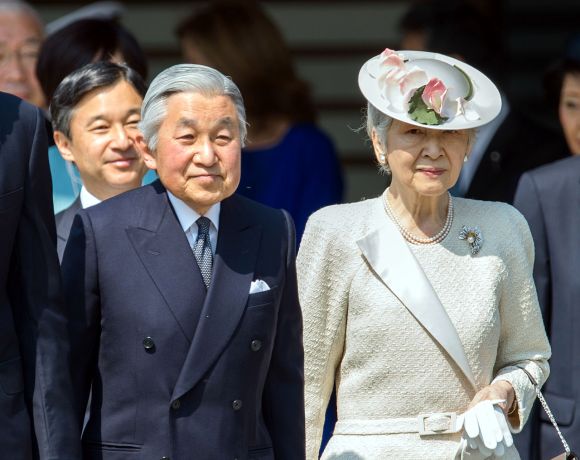
The date will bring an end to Japan’s current Heisei era.
In July last year, reports began surfacing that Japan’s Emperor Akihito would be breaking with centuries of tradition by requesting to abdicate the throne, in a move that would make him the first Emperor to relinquish his title in 200 years.
A month later, the reports were seemingly confirmed in a video message from the 83-year-old Emperor, where he expressed concerns about fulfilling his duties in old age and spoke about the heavy burden that can be placed on society and the Imperial Family when an Emperor stays on the throne until his life’s end.
▼ Emperor Akihito’s video message to the nation.
The deep respect with which the title of Emperor is held, and the fact that the system encoded in the Japanese Constitution did not allow for abdication, meant that the Imperial Household Agency refrained from making an official announcement about the Emperor’s wishes, although it was widely understood that abdication was imminent.
In April this year, the Japanese Government approved a special bill allowing the reigning Emperor to abdicate the throne. This bill specifically names the successor as Crown Prince Hironomiya Naruhito, making this a one-time provision designed specifically for the current Emperor.
▼ Crown Prince Naruhito is pictured here with his wife Masako and their daughter Aiko.
https://twitter.com/hkuspcoltgo1/status/804318945205288960With the correct system now in place to allow for abdication, commenters and analysts have spent the last few months speculating about the exact date when Emperor Akihito would step down. This interest in the abdication date stems from the fact that the event would have an immediate impact on society, not only for its historical and cultural importance, but also because the Japanese era would change as a result.
In Japan, years are numbered according to eras, which are named by the reigning Emperor. According to this system, 2017 is known as Heisei 29, given that this is the 29th year of Emperor Akihito’s reign. Abdication would effectively bring an end to the Heisei era and herald in a new, as yet unnamed era, to be decided upon by his successor, Prince Naruhito.
Today, numerous Japanese government officials have reportedly leaked the abdication date to the Asahi Shimbun, with the Emperor said to be stepping down on 31 March 2019.
▼ The Asahi Shimbun reported the abdication news this morning.
天皇陛下退位19年3月末 即位・新元号4月1日で調整 https://t.co/m3LRujlrSv
— 朝日新聞(asahi shimbun) (@asahi) October 19, 2017
According to the report, the Emperor’s eldest son, 57-year-old Crown Prince Naruhito, will ascend the throne the day after the abdication, on 1 April 2019, which is also the beginning of the fiscal year in Japan. It’s believed that Prime Minister Shinzo Abe will officially announce the date of abdication after meeting with top government officials and members of the Imperial Household Agency next month.
The government will announce the name of the new era sometime next year, and based on the provisions of the Special Law, the era will be enforced on the same day that Crown Prince Naruhito takes to the throne.
Source: Asahi Shimbun via My Game News Flash
Featured image: Wikimedia Commons/William Ng

 Japanese Emperor’s abdication date set, end of Heisei era now officially on the horizon
Japanese Emperor’s abdication date set, end of Heisei era now officially on the horizon Japanese Emperor’s abdication date to be decided next month, expected later than initial reports
Japanese Emperor’s abdication date to be decided next month, expected later than initial reports Confusion as Imperial official denies rumors that Japan’s Emperor Akihito plans to step down
Confusion as Imperial official denies rumors that Japan’s Emperor Akihito plans to step down End of the Heisei Era: Japanese government to announce new era name on 1 April
End of the Heisei Era: Japanese government to announce new era name on 1 April The one-year countdown officially begins for the end of the Heisei Era
The one-year countdown officially begins for the end of the Heisei Era Foreigner’s request for help in Tokyo makes us sad for the state of society
Foreigner’s request for help in Tokyo makes us sad for the state of society Japanese city loses residents’ personal data, which was on paper being transported on a windy day
Japanese city loses residents’ personal data, which was on paper being transported on a windy day Ghibli Park now selling “Grilled Frogs” from food cart in Valley of Witches
Ghibli Park now selling “Grilled Frogs” from food cart in Valley of Witches Osaka governor suggests lowering voting age to 0 to curb population decline
Osaka governor suggests lowering voting age to 0 to curb population decline Harajuku Station’s beautiful old wooden building is set to return, with a new complex around it
Harajuku Station’s beautiful old wooden building is set to return, with a new complex around it Suntory x Super Mario collaboration creates a clever way to transform into Mario【Videos】
Suntory x Super Mario collaboration creates a clever way to transform into Mario【Videos】 Mt. Koya planning to instate visitor’s tax to cope with huge tourist numbers
Mt. Koya planning to instate visitor’s tax to cope with huge tourist numbers Japan’s cooling body wipe sheets want to help you beat the heat, but which work and which don’t?
Japan’s cooling body wipe sheets want to help you beat the heat, but which work and which don’t? Starbucks Japan adds a Motto Frappuccino to the menu for a limited time
Starbucks Japan adds a Motto Frappuccino to the menu for a limited time Historical figures get manga makeovers from artists of Spy x Family, My Hero Academia and more
Historical figures get manga makeovers from artists of Spy x Family, My Hero Academia and more McDonald’s new Happy Meals offer up cute and practical Sanrio lifestyle goods
McDonald’s new Happy Meals offer up cute and practical Sanrio lifestyle goods Japanese ramen restaurants under pressure from new yen banknotes
Japanese ramen restaurants under pressure from new yen banknotes French Fries Bread in Tokyo’s Shibuya becomes a hit on social media
French Fries Bread in Tokyo’s Shibuya becomes a hit on social media Studio Ghibli releases new action figures featuring Nausicaä of the Valley of the Wind characters
Studio Ghibli releases new action figures featuring Nausicaä of the Valley of the Wind characters New private rooms on Tokaido Shinkansen change the way we travel from Tokyo to Kyoto
New private rooms on Tokaido Shinkansen change the way we travel from Tokyo to Kyoto Red light district sushi restaurant in Tokyo shows us just how wrong we were about it
Red light district sushi restaurant in Tokyo shows us just how wrong we were about it Tokyo Tsukiji fish market site to be redeveloped with 50,000-seat stadium, hotel, shopping center
Tokyo Tsukiji fish market site to be redeveloped with 50,000-seat stadium, hotel, shopping center All-you-can-drink Starbucks and amazing views part of Tokyo’s new 170 meter-high sky lounge
All-you-can-drink Starbucks and amazing views part of Tokyo’s new 170 meter-high sky lounge Beautiful Ghibli sealing wax kits let you create accessories and elegant letter decorations【Pics】
Beautiful Ghibli sealing wax kits let you create accessories and elegant letter decorations【Pics】 Studio Ghibli releases Kiki’s Delivery Service chocolate cake pouches in Japan
Studio Ghibli releases Kiki’s Delivery Service chocolate cake pouches in Japan New definition of “Japanese whiskey” goes into effect to prevent fakes from fooling overseas buyers
New definition of “Japanese whiskey” goes into effect to prevent fakes from fooling overseas buyers Our Japanese reporter visits Costco in the U.S., finds super American and very Japanese things
Our Japanese reporter visits Costco in the U.S., finds super American and very Japanese things Studio Ghibli unveils Mother’s Day gift set that captures the love in My Neighbour Totoro
Studio Ghibli unveils Mother’s Day gift set that captures the love in My Neighbour Totoro More foreign tourists than ever before in history visited Japan last month
More foreign tourists than ever before in history visited Japan last month New Pokémon cakes let you eat your way through Pikachu and all the Eevee evolutions
New Pokémon cakes let you eat your way through Pikachu and all the Eevee evolutions Sales of Japan’s most convenient train ticket/shopping payment cards suspended indefinitely
Sales of Japan’s most convenient train ticket/shopping payment cards suspended indefinitely Sold-out Studio Ghibli desktop humidifiers are back so Totoro can help you through the dry season
Sold-out Studio Ghibli desktop humidifiers are back so Totoro can help you through the dry season Japanese government to make first change to romanization spelling rules since the 1950s
Japanese government to make first change to romanization spelling rules since the 1950s Ghibli founders Toshio Suzuki and Hayao Miyazaki contribute to Japanese whisky Totoro label design
Ghibli founders Toshio Suzuki and Hayao Miyazaki contribute to Japanese whisky Totoro label design Doraemon found buried at sea as scene from 1993 anime becomes real life【Photos】
Doraemon found buried at sea as scene from 1993 anime becomes real life【Photos】 Tokyo’s most famous Starbucks is closed
Tokyo’s most famous Starbucks is closed One Piece characters’ nationalities revealed, but fans have mixed opinions
One Piece characters’ nationalities revealed, but fans have mixed opinions We asked a Uniqlo employee what four things we should buy and their suggestions didn’t disappoint
We asked a Uniqlo employee what four things we should buy and their suggestions didn’t disappoint Princesses, fruits, and blacksmiths: Study reveals the 30 most unusual family names in Japan
Princesses, fruits, and blacksmiths: Study reveals the 30 most unusual family names in Japan J-Pop singer to perform song written and composed by the emperor and empress at upcoming ceremony
J-Pop singer to perform song written and composed by the emperor and empress at upcoming ceremony Japan announces new era name, Reiwa, but what does it mean and why was it chosen?
Japan announces new era name, Reiwa, but what does it mean and why was it chosen? Emperor Akihito hints at abdication of throne in new video message
Emperor Akihito hints at abdication of throne in new video message Donald Trump will probably be the first foreign leader to meet with Japan’s new emperor
Donald Trump will probably be the first foreign leader to meet with Japan’s new emperor Pokémon GO player claims his in-game snapshot shows Japan’s new emperor and Pikachu together
Pokémon GO player claims his in-game snapshot shows Japan’s new emperor and Pikachu together Christian groups in Japan criticize emperor’s ascension ceremony as violation of constitution
Christian groups in Japan criticize emperor’s ascension ceremony as violation of constitution Japanese government proposes driver’s license change to make them easier for foreigners to read
Japanese government proposes driver’s license change to make them easier for foreigners to read Reiwa era gets anthropomorphised into a Japanese anime girl by otaku artists
Reiwa era gets anthropomorphised into a Japanese anime girl by otaku artists Twitter users say Japanese Prime Minister’s name is hiding in the kanji for Japan’s new era name
Twitter users say Japanese Prime Minister’s name is hiding in the kanji for Japan’s new era name Japanese government to outlaw carrying unbound knives on trains starting next year
Japanese government to outlaw carrying unbound knives on trains starting next year Prime Minster Abe tells Trump that imperial succession is “100 times bigger” than the Super Bowl
Prime Minster Abe tells Trump that imperial succession is “100 times bigger” than the Super Bowl “Disaster”: 2018 Kanji of the Year unveiled by Buddhist monk at Kiyomizudera temple in Kyoto
“Disaster”: 2018 Kanji of the Year unveiled by Buddhist monk at Kiyomizudera temple in Kyoto Man jumps off bridge in Osaka to celebrate Heisei era’s end, hits something other than water【Vid】
Man jumps off bridge in Osaka to celebrate Heisei era’s end, hits something other than water【Vid】 How to convert the Western calendar to Japanese Reiwa years
How to convert the Western calendar to Japanese Reiwa years Four new era names the Japanese government rejected before deciding on Reiwa
Four new era names the Japanese government rejected before deciding on Reiwa Japan issuing beautiful new coins to celebrate Emperor Naruhito’s enthronement
Japan issuing beautiful new coins to celebrate Emperor Naruhito’s enthronement
Leave a Reply